In todays interview we are welcoming Mr. Bruno Vath Zarpellon from AHK Brazil in. He is director of the Innovation and Sustainability Department in São Paulo and shares with us his thoughts about the winning startup from Brazil, Pix Force and the potential of the Brazilian startup ecosystem.
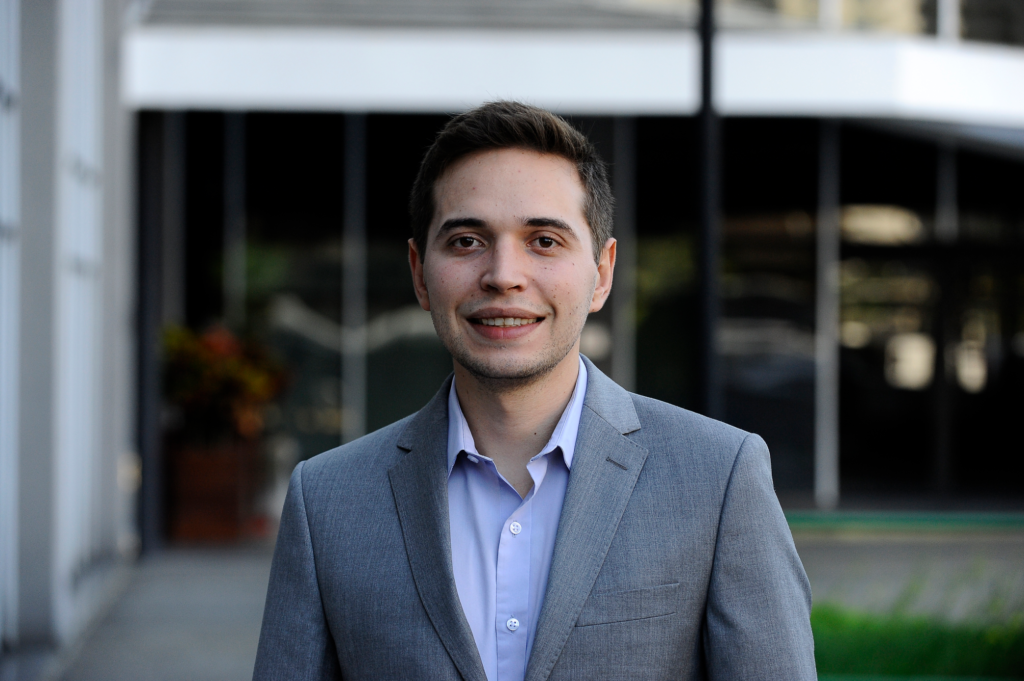
First of all, how did you find the startup Pix Force?
We can say the startup found us. Pix Force signed up and was selected twice for our acceleration program called “Startups Connected”. On the fourth edition, the startup won the challenge submitted by Voith Paper focused on the pulp and paper industry. Two years later, Pix Force won the sixth edition of Startups Connected providing a solution for Siemens in the energy efficiency sector. Startups Connected’s goal is to connect startups and big AHK-member companies such as BASF, Bayer, Siemens and Voith to work together.
Is the startup Pix Force representative of the Brazilian startup ecosystem?
Absolutely! According to the main startup ranking in Latin America, promoted by 100 Open Startups, in 2018 and 2019, the startup reached the first position in the Computational Vision category. In 2020 and 2021 it led the list of innovative businesses in Artificial Intelligence, proving its expertise in an increasingly competitive market. We are proud to know that Pix Force, a startup created in Brazil by Brazilian entrepreneurs, is succeeding and already has an international presence.
With this success of Pix Force, would you say that the startup scene in Brazil is booming?
Pix Force’s success is proof that the Brazilian startup scene has been booming for some time now. Even during the pandemic (2021), investment in startups tripled, surpassing 8 billion dollars and creating 10 new unicorns. Altogether, Brazil already has more than 20 unicorns. It is worth mentioning that today we have almost 15,000 startups in the country, around 3 times more than we had 5 years ago. Not to forget the 400 agents such as incubators, accelerators and other institutions that promote the startup scene here. Besides the city of São Paulo, the main hub for Brazilian startups, other cities also have strong startup communities, such as Florianópolis and Porto Alegre (both in the southern region) and Belo Horizonte (in the southeast).
What conditions (positive and negative) can startups find in Brazil?
I believe that in Brazil the main difficulties for the development of startups are not very different from the difficulties faced in other countries. Among them we can mention the high and complex tax burden, the bureaucracy for closing companies, the lack of support for entrepreneurs before becoming startups, access to financial resources for startups at certain maturity levels, in addition to the difficulty of accessing new clients and international markets.
Despite the barriers, the Brazilian market has several positive aspects for startups. With around 15,000 startups in the country and more than 20 unicorns, the pandemic did not prove to be an obstacle to market growth in 2021 - which represents its dynamic and the positive impact provided by different facilitating factors, which include: the population and the huge domestic market (the largest in Latin America), the receptivity and growing access to investments (having surpassed South Korea in Venture Capital), and the presence of several sectors in growth and expansion, such as agribusiness, renewable energy, environmental solutions and the health sector. Furthermore, the country also has an increasing development in infrastructure, with an estimated investment increase of 40% over the next 5 years, in addition to its remarkable availability of natural resources. Other than that, more than 80% of the population and all residences in Brazil are connected to the internet, with mobile devices being the most used.
Where are the potentials of the country?
Investors' favorite sectors include insurance and financial services, healthcare, software, logistics and retail. Other sectors such as Cleantech and Biotech have been showing great growth potential due to the characteristics of Brazil and global tendencies. A good example is the Green Hydrogen sector. Although the topic is still quite new and there are still few initiatives in Brazil, the country has 83% of its electricity matrix coming from renewable energies, therefore, occupying the first place among countries in the production of clean energy. This position is mainly due to its geographic and climatic characteristics, which enable the country's potential to become one of the largest producers and exporters of Green Hydrogen globally.
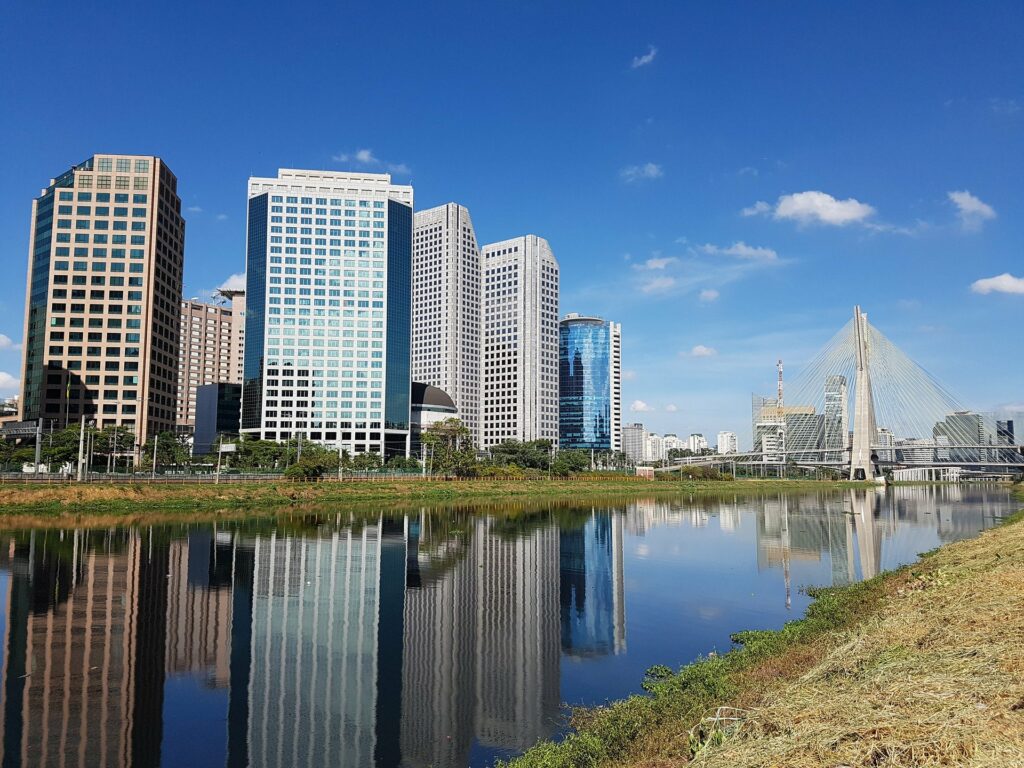
Is the government or the education system already setting a course or incentivizing start-ups? What are your experiences?
The Brazilian government has been carrying out a series of actions to promote the local startup ecosystem. In the legal field, the Legal Framework for Startups was released last year with the goal to encourage the creation of new businesses, offering more legal certainty for investors. Among the main points of the document, we can mention:
- Legal definition of a startup (e.g.: limit of 16 million reais as annual billing / about 2.700,00 euros)
- Angel investor legal protection
- Possibility of directing innovation incentive resources to startups
- Possibility of applying stock options in employment contracts
- Creation of an experimental regulatory environment (regulatory sandbox)
As for the incentives, today there are several initiatives that encourage entrepreneurship in its most diverse phases. Institutions such as SEBRAE, SENAI, FINEP, BNDES and EMBRAPII offer various types of subsidies via non-refundable resources at the national level, among other forms of incentive.
Regarding the bilateral scope with Germany, there are also interesting opportunities, EMBRAPII (Brazilian Company for Industrial Research and Innovation) and the CORNET German Network formalized in 2019 a partnership that allows small and medium entrepreneurs, including startups, to develop RD&I projects with industrial sectors of member countries participating in the network.
Another example of incentive carried out by the Brazilian government is the Rota 2030 program, which aims to support the strengthening of the automotive value chain, promoting cooperative projects in R&D in Mobility and Logistics.
Would you describe specifically what your role is as an AHK in the ecosystem?
The role of the AHK São Paulo is to promote open innovation between member companies and startups from Brazil and Germany, as well as to promote bilateral cooperation between the two countries.
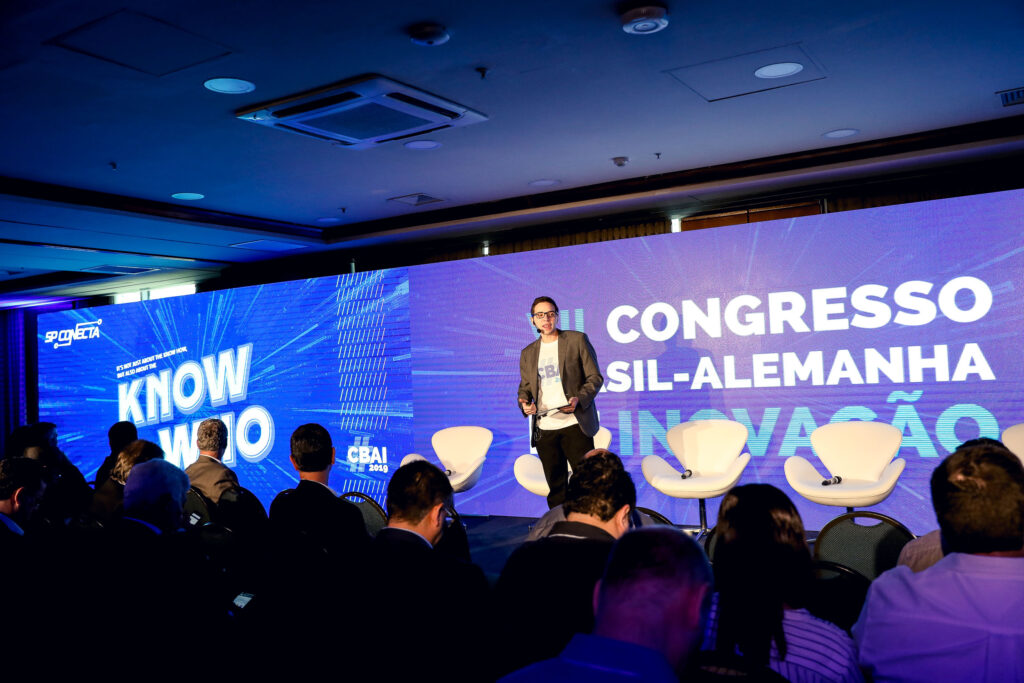
Last year AHK São Paulo was awarded among TOP 3 Startup Ecosystem in Brazil by the 100 Open Startups Ranking. This means that we are one of the most recognized actors in the Startups ecosystem by the practice of open innovation. Almost 400 startup programs have been screened in this ranking and graded by startups, who must select the institution that cooperated the most with their development. The Ranking 100 Open Startups is the main reference in the local market and the largest ranking in Latin America. We have been recognized at the award since 2019 and over the past few years, several startups that have gone through our Startups Connected program were recognized in the 100 Open Startups Ranking as the most innovative in their sector, including Pix Force.
To make it happen, we promote different activities, such as:
- Startups Connected Program: Founded five years ago, Startups Connected is an acceleration program, where selected companies and startups work on a concrete innovation project, based on a business challenge. We support the execution of these projects, facilitating interaction between the parties and offering agile development methodologies and connection with partners in different areas to obtain effective and measurable results. The challenges, in addition to solve business needs, seek sustainable solutions based on the 17 UN Sustainable Development Goals (SDGs).
- AHK Innovation Day: The purpose of the event is to present the main trends and best practices in a particular sector. After lectures and panels, a matchmaking takes place, holding a series of thematic meetings intending to connect companies and startups, which contributes to the generation of new businesses in a short period of time.
- Immersions in the German Innovation ecosystem: Aiming to contribute to the advancement of innovation in Brazil, we organized delegations to Germany, cradle of the 4th Industrial Revolution, so that Brazilian companies can get to know and understand how renowned German companies such as Bosch, Festo, TRUMPF, among others, have been implementing innovation in their organizations, processes and products.
- Studies (e.g.: Startups 4.0): As an example of study carried out by our chamber, since June 2021 we have been looking for startups operating in Industry 4.0 to carry out research on the profile of entrepreneurs, the context of startups and their relationship with other companies. In the first stage of this study, which was completed last year, we applied a survey to around 90 startups, validated the survey form and methodology, and compiled the preliminary results. From now on, with a 2.0 version of the survey, we are increasing the number of respondents so that we can have a statistical analysis that better represents the national ecosystem, once this project has been developed under the leadership of the Brazilian government.
Can you describe a stereotype of a typical Brazilian founder?
In general, Brazilians are very positive and creative people. We have a saying that tells a lot about the way we work and organize our personal lives: “Brazilians never give up”. Personally, I think many people identify to this saying because, despite challenges, we always come with a way of turning things around – and, of course, these characteristics are reflected a lot in the profile of the entrepreneurs in the country.
What are the connections to Germany?
Since 2008, Brazil has been a strategical partner for Germany and one of the main trading partners in South America. Despite the challenges that cultural and social differences between the two countries may cause, business and R&D connections have grown over the years. Just our AHK alone has been representing German economy in Brazil for the past 105 years. São Paulo is also the main German industrial location outside of Germany.
In your opinion, what makes the German market interesting for Brazilian startups?
Germany can be a perfect place for a soft landing of Brazilian Startups and the entrance for the European market. Entering the European market is a great attraction for Brazilian startups, since it provides access to largely skilled labor, strategic positioning enhancement and expansion of the consumer portfolio. Also, successfully selling to Germany is an important indicator to the business – if a technology can be sold under German sieve, which is very professional and detail-oriented, it means it is ready to be sold anywhere in the world. Germany is home to one of the most mature markets to disruptive solutions, which comes along with a positive perception for higher value-added products (e.g.:“green” products and solutions, and high technology) – a path in which many Brazilian startups have been going through.
German investment to attract foreign startups is algo impressive. Bavaria alone is investing 1,5 million euros for the construction of a Deep-Tech hub and the project AI+MUNICH is receiving 5,9 millions euros to create and develop and IA alliance in Munich.
What were your reasons for participating in the Start.up Germany Tour?
We saw a great opportunity for our best startups to explore one of the most promising hotspots for startups today and connect with large corporations, multinational companies and representatives of the "German Mittelstand", as well as some of the best startups in the German ecosystem.
Initiatives like this are essential to support the internationalization of Brazilian startups and insert them into a more competitive environment, in which they can increasingly thrive. Germany is globally for its strength in innovation and, when we talk about startups, it couldn't be different: the country is one of the most advanced in Europe when it comes to numbers related to startups. We are proud to be part of the initiative because that is our mission as one of the most important players in the open innovation Brazilian ecosystem.
